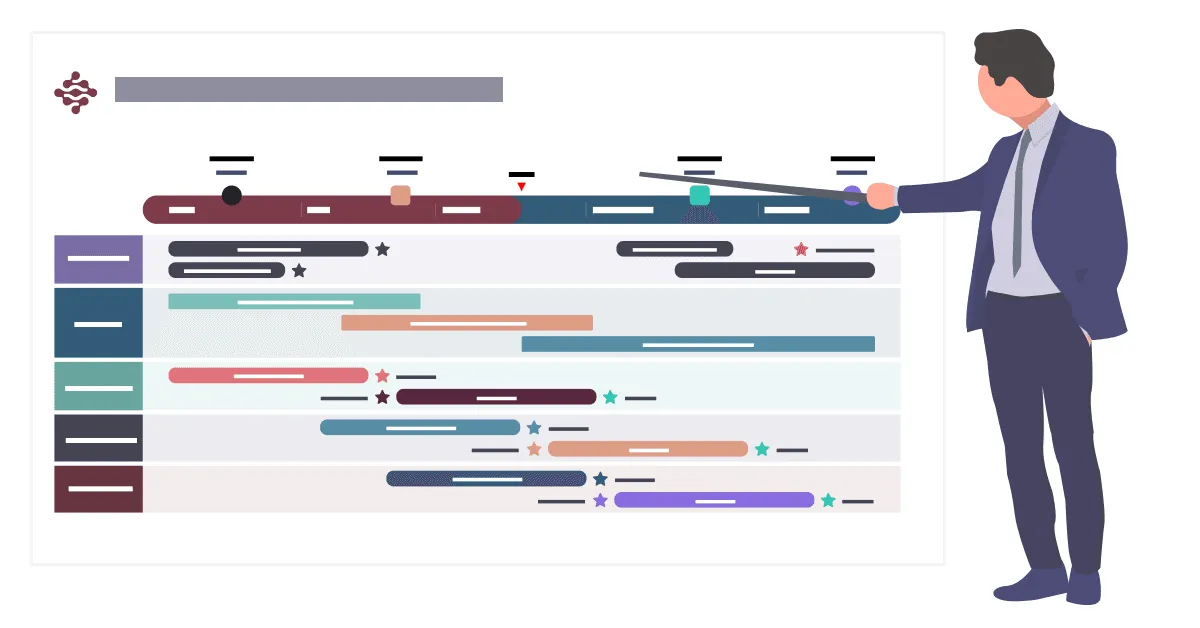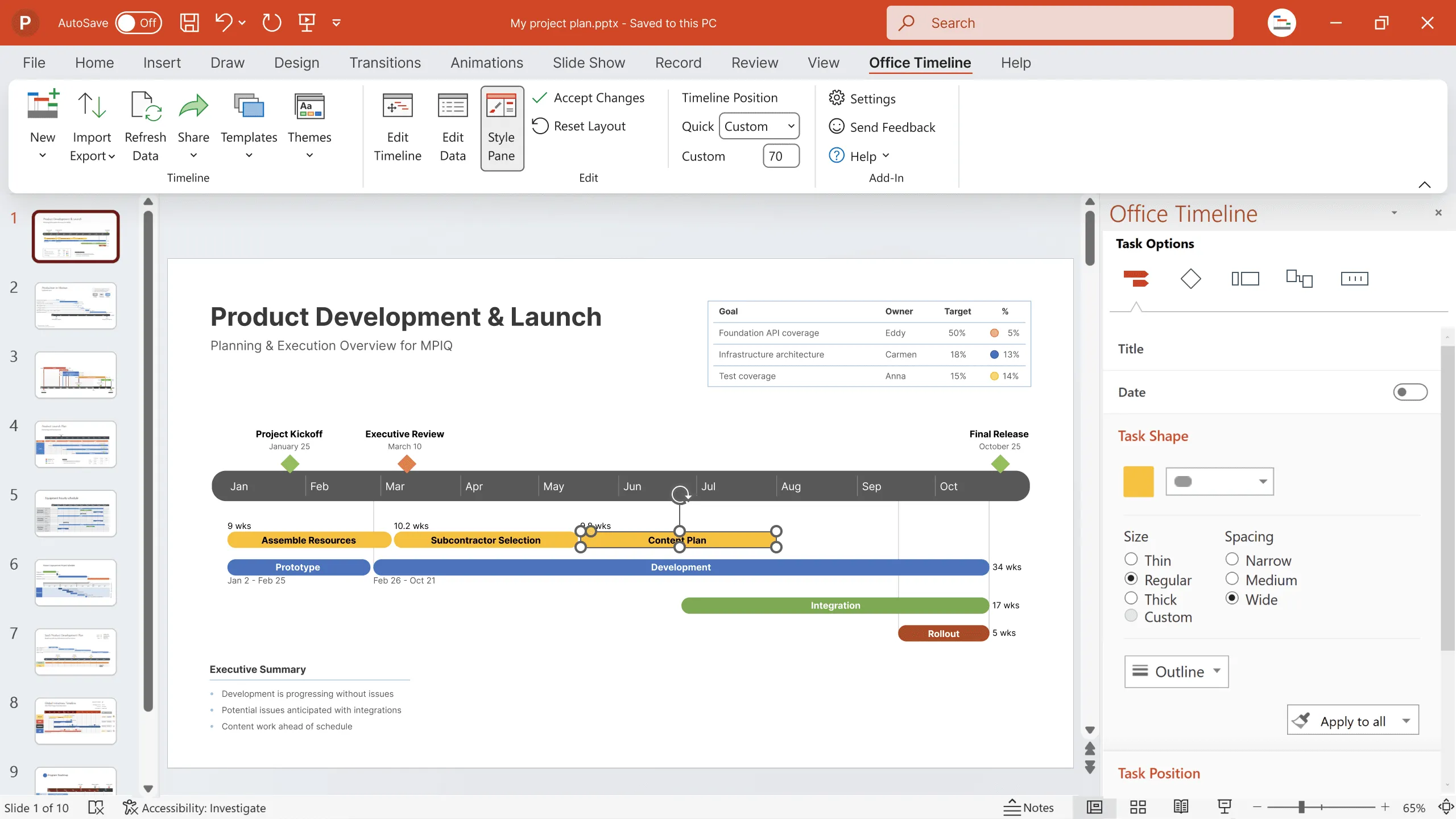What Is a Timeline (with Examples and Templates)
Unlock the power of timelines! Master planning with our guide featuring diverse examples and templates for every need. Streamline your schedule and execute with precision.

Example of a timeline
Last updated: February 26, 2024
Embarking on any project, whether it’s a business or personal initiative, requires careful planning and organization. Central to this process is the creation of a timeline – a visual roadmap that guides you through the various stages and milestones from start to finish.
In this article, we delve into the concept of timelines, exploring what they are, what they should include, and how to create them effectively. We’ll also showcase ten diverse timeline examples, each tailored to different needs and objectives, providing you with the tools and inspiration to bring your plans into action with clarity and precision.
Whether you’re a project manager, a marketer, a legal professional, or simply someone looking to streamline their daily schedule, understanding the power of timelines is essential for successful project management and execution.
Let’s dive in and uncover the art of timeline creation together.
What is a timeline?
A timeline is a type of graphic that arranges a chain of events in chronological order. Perfect for telling stories and visualizing projects and processes, timelines are generally used to:
- Give an overview of events;
- Detail an agenda;
- Highlight critical points in time;
- Depict different temporal relations;
- Track progress over time of multiple events happening simultaneously;
- Identify specific patterns within a course of procedure in a streamlined format.
What should a timeline include?
Representing an alignment in time and making a chronological statement, a timeline should include the series of events and activities (milestones and tasks) that you want to display on your graphic, along with their dates to mark their occurrence over a particular phase.
Whether you employ this type of project management chart for knowledge sharing or tracking the progress of a plan, here are the two main things you need to consider in order to outline the structure of a basic timeline:
- Listing the main steps/stages of your plan and setting clear deadlines– break up your work into tasks with start and due dates to estimate how much time each of them will take;
- Figuring out the logical order in which your tasks will occur – identify the sequence of planned activities, considering task dependencies to determine which tasks must be completed first and which ones rely on others for initiation.
How to create a timeline
Now that we’ve covered what timelines are and what they should include, you can make a timeline either from scratch or by starting from a template. There are various purpose-built tools to help you achieve this goal, and one of most accessible ones is our professional timeline maker, that you can try for free directly from your browser.
If drafting a timeline from start to finish is too time-consuming, opting for a template might be the better alternative. Below, we’ve put together a varied collection of 10 timeline examples that you can customize depending on your needs to effectively convey project plans, team schedules or workflows, and other similar chronologies. These are:
Best 10 timeline examples:
All of them have been designed natively in PowerPoint so that you and any team member who uses the presentation platform can contribute, edit and share them with ease.
Each of the templates can be customized in PowerPoint either:
- by manually replacing the placeholder texts with your own data and restyling any colors, shapes, and positions;
- or automatically, by using a PowerPoint add-in called Office Timeline.
If you opt for the second option, you need to install the free 14-day trial from Office Timeline, which will add a new tab to the PowerPoint ribbon.
Once the plugin is installed, follow these steps to quickly build, customize and update any of the timeline examples presented below:
- Click on the Download button under the template of your choice.
- Once downloaded, double-click to open it in PowerPoint.
- Select the Office Timeline tab on the PowerPoint ribbon, and then click the Data Edit button.
- Edit the data with your own milestones and tasks.
- Click Save to instantly update the template.
Timeline examples to bring your plans into action
1. Project implementation plan timeline
Designed to help project managers and team leaders create clear tactical plans effortlessly, the project implementation plan template provides the much needed bird’s eye view of an entire project. By turning strategic goals into actionable steps, it enables all team members to quickly see what they are expected to deliver, and when. The easy-to-follow format makes this graphic a good tool not only for internal communication, but also for presenting the overall picture to management, clients and other non-project audiences.
Since effective planning lies at the heart of successful project management and delivery, this template can also be used to show project dependencies, track individual task progress as the project moves forward, or identify at-risk tasks.
2. Gantt Chart template
Including a timeline with editable milestones to highlight key events, this free Gantt chart template outlines a project schedule at a high-level in a simple and user-friendly manner. Unlike most Gantt charts that are complicated and difficult for other people to read and understand, this timeline template maps out the essential and can be easily included in communications such as project reviews, proposals, plans, scorecards, and status meetings.
3. Marketing plan timeline
Any good business initiative relies on a solid marketing plan which usually takes pages of documents to be detailed. This timeline example offers an effective reference point to support the delivery of your marketing plan and assess its progress. Use this free marketing timeline template to present important marketing strategies and communicate with clients, management and other high level audiences that need to be briefed in a clear, easy-to-understand way.
4. Sales plan timeline
Having a good sales plan is essential to achieving sales and marketing goals. This timeline template enables sales leaders, marketers, and account executives to illustrate theirs with clear objectives laid out monthly, quarterly, or annually and present it to staff, sales teams, and management. Used as a visual aid in important meetings, it helps align organizations and management behind the key targets and deadlines of their sales campaigns. Alternatively, it can serve as a scorecard to present a plan’s progress against its objectives.
5. 1 year timeline
The 1-year timeline example is ideal for planning and outlining objectives before embarking on various initiatives, campaigns, marketing programs, or personal projects. It enables you to present your plan to clients and stakeholders in a highly visual and familiar graphical format, facilitating buy-in, stating intentions, and providing updates on progress.
6. Event planning timeline
Illustrating all the major deadlines on a single summary slide, the event planning timeline was designed to give planners, their teams, and partners the ability to keep track of what items need to be done and when. Easily accessible and shareable, this template helps you never lose sight of pending milestones and is a resourceful tool to manage teams and vendors.
7. Crime timeline template
Providing a linear outline for events, this timeline template will help attorneys lay out the key facts and circumstances of their case in a way that is simple for any audience to understand. Use this timeline example to better structure arguments, analyze events, and prepare for trial with a chronological, visual exhibit that increases the jury’s understanding of your oral discourse.
8. Daily schedule timeline
Graphically displayed as an hourly Gantt chart rather than as a spreadsheet, this downloadable timeline template can be easily printed in full color, shared in emails or included in presentations. Unlike most list-based daily schedules which don’t accommodate schedule overlapping, this graphic comes with a simpler, easy-to-read layout that lets viewers check the calendar at a glance.
9. Pharmaceutical product discovery timeline
This timeline template was designed to help pharma professionals involved in the development of a new drug to stay on track in this complex, multi-staged process. Covering the key phases of the discovery of pharmaceutical products, along with major milestones such as drug selection or approval, it documents the journey from research to commercialization and lays out a clear roadmap for a project of this magnitude.
10. Generic timeline
With a basic structure that displays a series of milestones and an elapsed time indicator on the timeband, this visual is suitable for historical presentations, project reviews, status reports, plan presentations, scorecards, or for any other effort that requires a simple project schedule or the illustration of a plan.
Check out more templates
For more examples to get inspired in building stylish timelines, visit our timeline gallery or explore the free, simple-to-use built-in-app templates offered by our online timeline maker.
FAQs about timelines
Explore our FAQ section for answers to common questions about timelines, from their importance in project management to tips for creating and managing them effectively.
Timelines are crucial in project management as they provide a visual representation of project schedules, milestones, and deadlines. They help teams stay organized, track progress, identify project dependencies, and communicate project timelines effectively to stakeholders.
The level of detail in a timeline depends on the project’s complexity and audience. For high-level overviews, focus on key milestones and major tasks. For more detailed timelines, include specific tasks, deadlines, and dependencies. Consider the needs of your audience and adjust the level of detail accordingly.
There are various tools available for creating timelines, ranging from simple spreadsheet software to specialized project management tools. Commonly used solutions include Microsoft Excel, PowerPoint, project management software like Microsoft Project, and visual timeline makers such as Office Timeline.
For more resources on choosing the right fit for your needs, check out our review of the 10 best timeline software and timeline makers.
Here are some of the main pitfalls to avoid when creating timelines:
• underestimating task durations;
• overlooking dependencies;
• failing to involve key stakeholders in timeline development;
• neglecting to build in buffer time for unforeseen delays.
It’s essential to conduct thorough planning, regularly review timelines, and communicate effectively with all project stakeholders to mitigate these risks.
For a comprehensive guide on timeline creation, check out our collection of tutorials on how to make timelines using various productivity tools.
Flexibility is key when managing changes to timelines. As project circumstances evolve, you will need to:
• regularly review and update timelines to reflect the latest status;
• communicate changes to stakeholders promptly and assess the impact on project deadlines and resources;
• prioritize tasks, adjust dependencies, and allocate resources accordingly to accommodate changes effectively.
Visit our dedicated project management page for more tips on maintaining accurate project timelines.
Those who want to show more details or update their timeline regularly and repeatedly might want to learn how to quickly update project plans with Office Timeline.
Project management tips and tricks
Tagged With:
TimelineTurn project data into professional timelines
Get the advanced features of Office Timeline free for 14 days.













